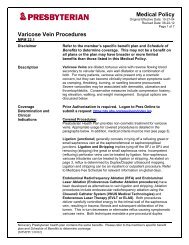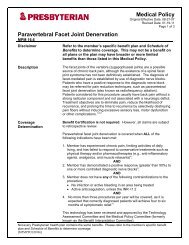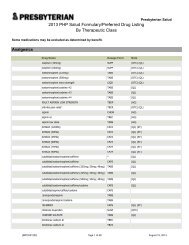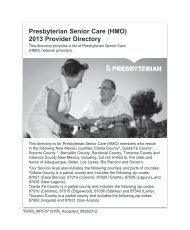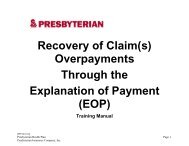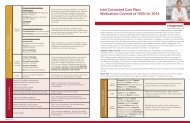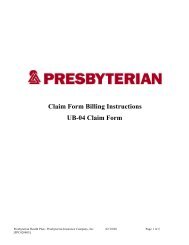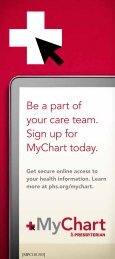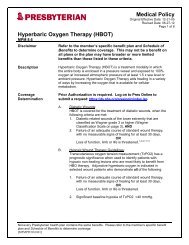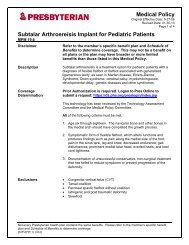2013 Practitioner and Provider Manual - Presbyterian Healthcare ...
2013 Practitioner and Provider Manual - Presbyterian Healthcare ...
2013 Practitioner and Provider Manual - Presbyterian Healthcare ...
You also want an ePaper? Increase the reach of your titles
YUMPU automatically turns print PDFs into web optimized ePapers that Google loves.
Quality Improvement Program<strong>Presbyterian</strong> continually assesses member <strong>and</strong>provider satisfaction with the UM processes toidentify areas needing improvement. Under- <strong>and</strong>overutilization of pharmacy, physical, <strong>and</strong>behavioral health care services is monitoredquarterly to facilitate the delivery of appropriatecare. Results are compared to establishedthresholds.21. Web ResourcesThe <strong>Presbyterian</strong> <strong>Healthcare</strong> Services (PHS)website, http://www.phs.org, has been enhanced toimprove member access to information that can beuseful when making health care decisions.Information about many services is available on<strong>Presbyterian</strong>’s website, including the following:Information about claims payments, medicalbenefits, <strong>and</strong> pharmacy benefits. Membersmay request identification cards <strong>and</strong> canmake PCP changes.The provider directory <strong>and</strong> hospital directoriesto help current <strong>and</strong> prospective memberschoose providers, pharmacies, <strong>and</strong> hospitals.Web technology for members for e-appointments, e-consultations, e-referrals,online personal health information, <strong>and</strong> forrequesting lab reports.<strong>Presbyterian</strong> evaluates website functionality toimprove usability. Processes for posting <strong>and</strong>maintaining accuracy <strong>and</strong> currency of content <strong>and</strong>information are monitored.22. Voice of the Customer<strong>Presbyterian</strong> underst<strong>and</strong>s the importance ofobtaining feedback from our members <strong>and</strong>providers. <strong>Presbyterian</strong> collects feedback frommembers <strong>and</strong> providers to improve satisfaction <strong>and</strong>loyalty through improved processes <strong>and</strong>communication. We collect feedback in a variety ofways.Survey DataWe conduct relationship surveys such as theCAHPS ® survey, the annual provider satisfactionsurvey, <strong>and</strong> the internally developed quarterlymember survey. The reasons for conducting arelationship survey are to trend results over time,compare performance against external benchmarkswhen available, identify drivers of satisfaction <strong>and</strong>loyalty, <strong>and</strong> identify opportunities for improvement.In addition, we occasionally conduct transactionalsurveys to evaluate the performance of specificinteractions with <strong>Presbyterian</strong> such as a postcustomer-servicecall survey or a web survey.Complaint <strong>and</strong> Inquiry DataWhenever a member contacts the health plan,whether through calls, emails, or letters, thetransaction is logged into the advocate system.Complaints, appeals, <strong>and</strong> grievances are capturedin a similar manner. This data is aggregated <strong>and</strong>reported at least annually to identify trends <strong>and</strong>opportunities for improvement. The data can befiltered in many different ways to perform variousanalyses such as by product type, employer group,inquiry type, <strong>and</strong> customer type.Qualitative Research<strong>Presbyterian</strong> also uses qualitative researchmethodologies including focus groups, formal <strong>and</strong>informal interviews, usability studies, <strong>and</strong> mystery12-102014 <strong>Practitioner</strong> <strong>and</strong> <strong>Provider</strong> <strong>Manual</strong> - Ver. 3





